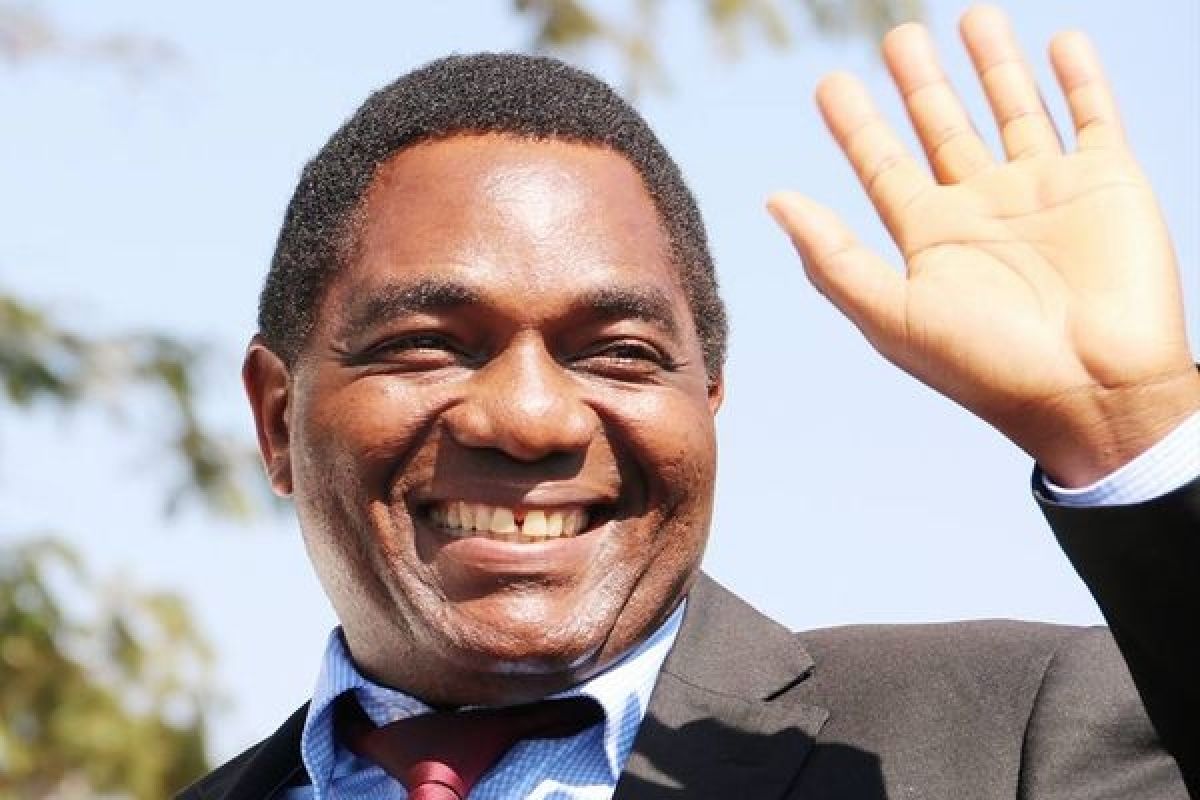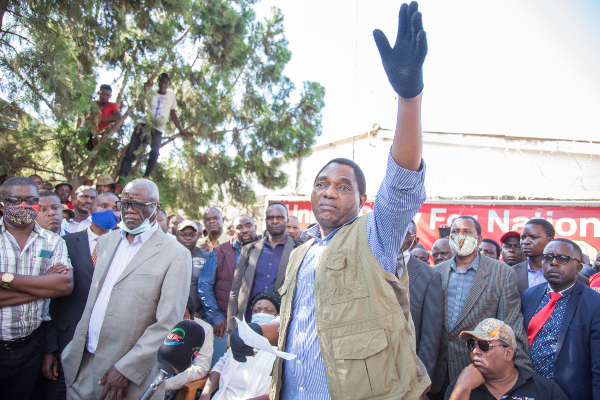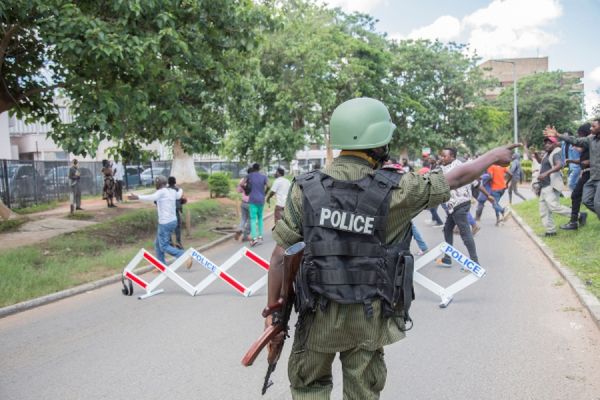New hopes for southern African regime change

While West Africa is once again riven by coups, the south of the continent is buoyed by the peaceful transfer of power in Zambia. By Christopher Clark in Cape Town.
On August 24, veteran Zambian opposition leader Hakainde Hichilema, 59, was sworn in as the country’s seventh president at a ceremony at the National Heroes Stadium in the capital, Lusaka.
‘It’s a new dawn. The time has come for all Zambians to be truly free,’ Hichilema announced to a rapturous capacity crowd of 60,000, vowing to build a ‘united, prosperous and equitable Zambia’.
At the sixth time of trying, Hichilema and his United Party for National Development (UPND) had swept to a resounding victory in a tense and sometimes violent election 10 days earlier on August 12, taking more than 2.8 million votes.
This equated to 59 per cent of the overall count and put the UPND more than a million votes ahead of outgoing president Edgar Lungu’s Patriotic Front (PF), making it one of the biggest electoral victories in Zambian history.
The election also recorded a strong voter turnout of around 71 per cent.
Having initially contested the validity of the vote, Lungu ultimately agreed to hand over the reins without a fight. Zambia’s third peaceful transfer of power to an opposition party since 1991 has prompted hope of a significant change in the country’s fortunes after six years of spiralling economic crisis and deepening authoritarianism under Lungu.
‘There is a lot of excitement and confidence in the new government,’ said Ernest Chanda, editor of the independent Zambian newspaper The Mast.
‘I’m very optimistic that we will see some positive changes even in the next few months.’
Despite past precedent, the peaceful transfer of power has been hailed as a remarkable outcome for a country that deployed the army on the streets and briefly imposed an internet shutdown in the run-up to this year’s vote.
‘We knew that Zambians were tired of Lungu and the PF, but I was still surprised that Hichilema won,’ said Laura Miti, director of the Alliance for Community Action, an NGO based in Lusaka that works on public accountability.
‘I thought that Lungu would lose, but that his party would manage to rig the elections to secure victory. What is now clear is that the Lungu administration was incompetent in every way, including rigging.’
Hichilema’s rise to power is an equally striking turnaround on a personal level.
In 2017, as the PF systematically gutted the judiciary and clamped down on opposition leaders, activists and independent media, the businessman-turned-politician spent 127 days in prison on trumped-up treason charges after he’d allegedly blocked Lungu’s motorcade at a cultural festival.
During his acceptance speech after the announcement of the August 12 election results, Hichilema pledged to foster a ‘better democracy’ with a focus on ‘the rule of law, restoring order, respecting human rights, liberties and freedoms’.

Above: Hakainde Hichilema, leader of the United Party for National Development (UPND). Getty.
But his promise to fix Zambia’s broken economy remains his prevailing election promise.
This helped to secure the decisive youth vote in an election where around 54 per cent of registered voters were under the age of 35, an age bracket where unemployment rose to more than 22.5 per cent in 2020.
It is unsurprising then that Hichilema’s first cabinet appointment three days after his inauguration was his new finance minister Situmbeko Musokotwane, an experienced international economist serving his second stint in the role.
Musokotwane has already vowed to conclude talks with the International Monetary Fund (IMF) on a lending programme by October as part of a bid to pull Zambia out of its protracted debt crisis.
‘Everyone I am in contact with in Zambia is really hoping and rooting for Hichilema and his new cabinet to succeed,’ Ringisai Chikohomero, a researcher at the South Africa-based Institute for Security Studies, told NewsAfrica.
Such hope has also extended beyond Zambia’s borders, with Hichilema’s election garnering a particularly effusive response from neighbouring Zimbabwe, which itself is due to head to the polls in 2023.
‘The people of Zambia continue to inspire us all,’ posted Nelson Chamisa, leader of Zimbabwe’s largest opposition party, the MDC-Alliance, on Facebook.
‘We are next. Our turn as Zimbabwe is coming. We won’t disappoint.’
Meanwhile, Joseph Makamba Busha, leader of the opposition FreeZim Congress party, said ‘the winds of change’ are certainly sweeping across southern Africa, adding: ‘Zimbabwe is next to breathe fresh air in 2023.’
Chikohomero was quick to dismiss such sentiments as ‘childish excitement’ that fail to take into account the markedly different contexts of Zambia and Zimbabwe: ‘The relationship that President Lungu had with the military and the securocrats in Zambia was certainly a convenient one for a period of time. But in Zimbabwe, the ruling party and the military are joined at the hip. They are essentially one and the same thing.’
He added that Zimbabwe’s president, Emmerson Mnangagwa, has created a political environment, often using the pretext of Covid-19 restrictions, where ‘the only voice, the only movement, the only mobilisation is done by him and his party’.
For his part, Mnangagwa was quick to dismiss any swirling hopes that the democratic transition witnessed in Zambia might spill over to the other side of the Zambezi.
‘If anyone dreams about what happened in Zambia happening in Zimbabwe, they should wake up,’ he said at a recent rally.
His presidential spokesperson George Charamba went a step further in what appeared to be a thinly-veiled threat of a repeat of the state-sanctioned violence that has been a consistent feature of past Zimbabwean elections: ‘If you think the military are just wearing overalls [military gear] for Chamisa to come in and rule, fear God,’ he wrote on Twitter.
Zambia’s recent polls have, according to a number of observers, highlighted that the country has a ‘muscle memory of democracy’ that Zimbabwe sadly lacks.

A police officer gestures towards protesters demonstrating against the arrest opposition leader Hakainde Hichilema in Lusaka on December 23, 2020.
But even at the domestic level, Hichilema’s landslide victory is still only half the battle.
In addition to a woeful economic climate that has been exacerbated by the country’s lockdown strategy, as well as the gross mismanagement of public resources by the departing PF, the country’s political landscape remains riven by factionalism and ethnic partisanship, another of Lungu’s legacies.
Such divisions and competing interests also exist within Hichilema’s own party, so he will have to tread carefully in his stated bid for unity.
As the new president tries to strike the right balance, some Zambians have expressed disappointment at certain appointments in his new cabinet. ‘A number of people are unhappy that there aren’t more women,’ according to Miti of the Alliance for Community Action.
‘And there are also a few appointments from the old guard that have a bit of a chequered past.’
Meanwhile, newspaperman Chanda, said President Hichilema will face strong calls to root out and prosecute corruption both within the ranks of the departing PF and his own party.
‘The Zambian people will not forgive him easily if he does not do this very quickly,’ he added.
It also remains to be seen how Hichilema will approach the ongoing Covid-19 pandemic, an issue on which he was largely silent during his election campaign.
The country has thus far steered clear of reimposing the stringent lockdown measures that last year helped push the southern African nation into its first recession for more than two decades.
For now, there remains a sense among the majority of Zambians that things are looking up in the wake of Hichilema’s election.
This has been accompanied by a great sense of relief that the political crisis many predicted has been averted.
Nevertheless, according to Miti, the recent and jarring memory of Lungu’s repressive reign will continue to serve as a stark warning against any complacency and help to ensure that Hichilema is held to his promises of sweeping changes.
‘He has to stamp his authority and his character on the party starting right now,’ she added.
‘After the experience of the elections, and particularly the way that so many young people have become politically engaged, Zambians are certainly not going to let him have it easy.’



